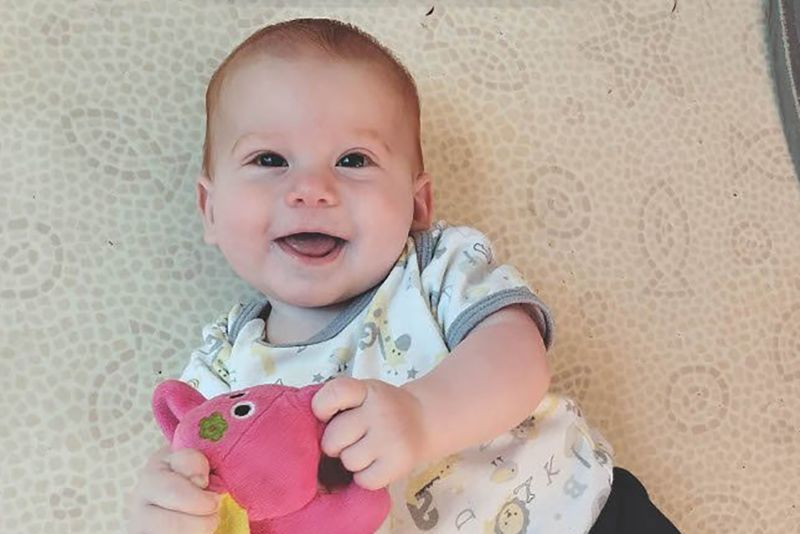
This 10-month old is among the children still held captive or missing in Gaza
At 10-months-old, Kfir Bibas has now spent more than a fifth of his young life in captivity, his doe-eyed face and bright red hair a vivid symbol of the pain and suffering endured by Israel’s hostage families.
More than 50 days since his abduction by Hamas militants from their home in southern Israel, Kfir’s family say they are no closer to knowing whether he is safe – or even alive.
“We are not sure if he can make it. Every day that he is staying there is a real, real danger to his life.”
Kfir, his four-year-old brother Ariel, their mother, Shiri, and presumably their father Yarden were all kidnapped from Nir Oz, an Israeli kibbutz that was devastated when it came under attack by Hamas militants on October 7. The attackers murdered more than a quarter of the community and seized scores of others, as they fired at people’s homes, looted and destroyed what they could.
Some 1,200 people, most civilians, were slain by Hamas across southern Israel that day – the largest terror attack on Israel since the country’s founding in 1948.
A video of the Bibas family’s abduction became one of the early striking moments of that day, as a terrified Shiri clung tightly to her children, with Ariel still sucking his pacifier. The children do not cry, nor make a sound as Hamas militants surround their shaken mother, a blanket wrapped around her body. Their grandparents were killed in the attack, Keshet added.
The boys’ father was hit by a hammer, his sister has said, with no further information available on his current condition or whereabouts. Yarden’s cousin, Keshet, has said the family believes Yarden was separated from his wife and children, based on videos that they have seen.
“It doesn’t make any sense that anyone can let this keep going,” Keshet said. “It’s inhumane. It’s so scary.”
Hamas is believed to have held more than 200 hostages in Gaza prior to the releases negotiated with Israel. Under the breakthrough truce agreement, groups of Israeli citizens and other nationals – mostly women and children, in line with the terms of the agreement – have been freed every day since last Friday.
More than 14,800 Palestinians, including 6,000 children, have since been killed in Gaza since Israel launched its offensive in response to the Hamas terror attacks of October 7, according to figures from the Palestinian Ministry of Health in the West Bank, which draws its data from Hamas-run health authorities in the Gaza Strip.
As part of the truce deal Israel has released Palestinian women and children detainees from its prisons, many of whom have never been charged or sentenced.
The initial four-day truce was extended by an additional two days on Monday, as stories began to trickle out from the families of freed hostages, giving the first insights into what life had been like in captivity.
On Monday, Israel Defense Forces spokesperson Daniel Hagari said that the Bibas family is not currently held hostage by Hamas, which further complicates release efforts.
While Hamas runs Gaza, other militant groups operate there including organizations such as Palestinian Islamic Jihad.
Kfir, Ariel and Shira’s names are yet to appear on a list of hostages expected to be freed. An estimated eight children are still being held by Hamas, and their faces have galvanized a mourning nation clamoring for their return.
More than 100 people gathered in Tel Aviv on Tuesday to release orange balloons into the sky to honor the two Bibas boys and their mother, agency pictures showed.
The sheer youth of Kfir has captured Israeli attention and anguish. The baby boy was still being bottle-fed and wasn’t at a stage where he was eating solid food when he was taken.
“He needs baby formula,” Keshet said through tears, adding the family is also extremely worried about Ariel’s health.
“Ariel is a fragile child and has several medical conditions,” he said, explaining that the four-year-old has a skin condition which needs treatment. “He is such a lively child, and he really loves cars and tractors,” he added.
For Shiri’s cousin, Yifat Zailer, the days and nights have been “emotional and stressful.”
Every day, Zailer hopes to see her family’s names on the list of hostages to be released.
“There’s a 10-month-old baby that is still being held captive. His life is at risk. No child should be pawned or held as leverage,” she said, her face gaunt and eyes sullen.
“Hopefully this will be over soon, and we can somehow go on to repair our shattered – completely shattered – life here.”
